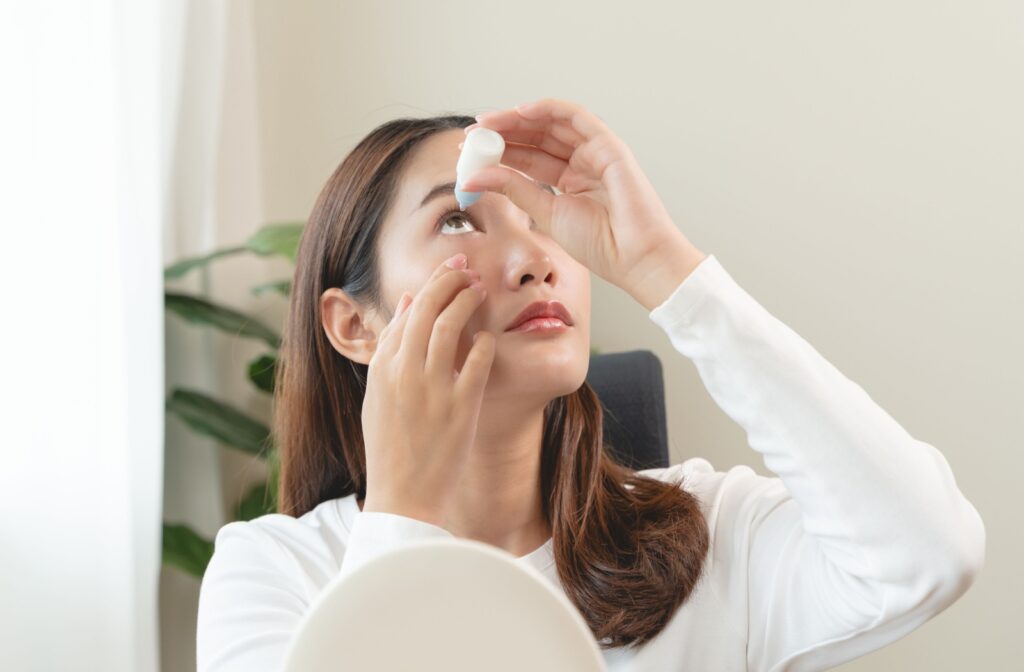Allergies are a common problem. They aren’t just an inconvenience—they can cause all kinds of symptoms and problems that get in the way of your everyday life. When they affect your eyes, they can quickly start interfering with your vision. But can allergies make your eyes blurry, or is this something else?
If you find yourself dealing with allergies, you’ve probably noticed blurry vision at times. This is completely natural, and it’s often related to other allergy symptoms. Fortunately, you can find relief through eye drops, compresses, and professional help from your optometrist.
Do Allergies Affect the Eye?
Allergies are the body’s response to a foreign substance like pollen or pet dander. When these substances enter your body, the immune system produces antibodies to fight them off. This causes symptoms like sneezing, itching, and congestion.
Just like any other part of the body, the eyes are often affected by allergies. They’re an extremely sensitive organ, and they’re often susceptible to inflammation and irritation. When an allergen comes into contact with the eyes, it triggers a response designed to help flush away or burn out the allergy.
This reaction can easily affect the eye’s surface and internal structures. The result can vary, but it often involves some degree of itchiness and discomfort. This can vary in intensity and cause all kinds of other symptoms that impair your everyday life.
The Symptoms of Eye Allergies
Eye allergies can develop whenever you’re exposed to various allergens. They range from mild to severe, but often cause symptoms such as:
- Itching
- Redness
- Tearing
- Swelling
- Gritty feelings
- Irritation
These symptoms are extremely inconvenient. Your eyes may flood with tears or develop significant inflammation. This eventually can even lead to vision troubles that become much more problematic.
How Allergies Affect Vision
When you’re experiencing an allergic reaction, your body’s response often affects the tear film. The irritation can distort this tear film and change its surface. This uneven surface alters light as it enters the eye and can affect your ability to focus.
Rather than focusing on the retina, light scatters as it enters the eye. This leads to blurry vision and halos around light sources. While these symptoms aren’t permanent, they can be frustrating.
However, it’s important to note that blurry vision isn’t always caused by allergies. If you develop blurry vision but no other allergy symptoms, visit your optometrist as soon as you can. They’ll work with you to diagnose the underlying cause of your vision issues and help you make a plan going forward.

Tips for Treating Eye Allergies
Preventative measures can make a big difference when managing eye allergies. First, try to identify what your specific allergens are. Knowing what sets off your symptoms is a great starting point—it helps you avoid these triggers in the future.
It also helps to keep your windows closed during pollen-heavy seasons. You can use air purifiers to minimize your indoor allergen exposure and make sure to stay hydrated. These are small adjustments, but they help maintain indoor air quality and reduce the risk of setting off your symptoms.
If you’re already experiencing allergy symptoms, it also helps to:
- Use artificial tears to wash away allergens
- Apply cold compresses to soothe irritation
- Keep your living space clean and dust-free
- Wear sunglasses outdoors to protect your eyes
For persistent issues or severe symptoms, talk to your optometrist. They can guide you through symptom management and recommend the right type of treatment. Whether through antihistamine eye drops or more precise treatment, professional support is key.
When to Seek Professional Help
While many allergy symptoms can be managed at home, this isn’t always the case. There are certain times when professional help is necessary to keep your vision clear.
If you notice at any point that your symptoms aren’t improving, don’t leave it unaddressed. Watch out for severe signs that something is wrong, such as:
- Significant eye pain or discomfort
- Sudden changes in vision or the appearance of “floaters”
- Excessive redness and swelling that doesn’t subside
- Persistent discharge from the eyes
- Sensitivity to light or difficulty seeing at night
These symptoms indicate something much more serious. Often, these require immediate intervention from an eye care professional. Don’t be afraid to reach out for help—early intervention is a great option. It’s key to preserving your vision.
Let Our Team Help
Blurry vision from allergies can be challenging. However, with some simple at-home changes and professional support, they’re also often manageable.
Here at Eye Lab, we know how frustrating blurry vision can be. If your eye allergies or vision issues are starting to impact your everyday life, contact our team. We’re here and ready to help, so book your appointment today! Relief could be just around the corner.





